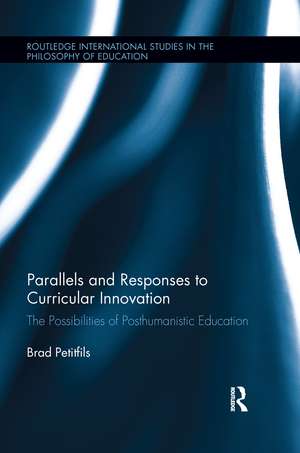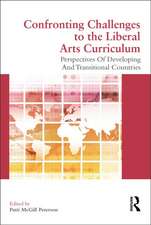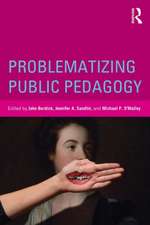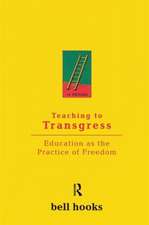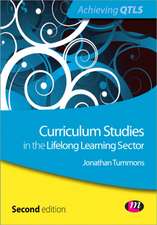Parallels and Responses to Curricular Innovation: The Possibilities of Posthumanistic Education: Routledge International Studies in the Philosophy of Education
Autor Brad Petitfilsen Limba Engleză Paperback – 18 noi 2016
The curricular innovation that accompanied the first shift is considered through the rise of the Society of Jesus (the Jesuits). These men created the first "global network" of education, and developed a humanistic curriculum designed to help students navigate a complicated era of the known (human-centered) and unknown (God-centered) universe.
The curricular innovation that is proposed for the current shift is guided by the question: What should be the role of undergraduate education become in the 21st century? Today, the tension between the known and unknown universe is concentrated on the interrelationships between our embodied spaces and our digitally mediated ones. As a result, today’s undergraduate students should be challenged to understand how—in the objectively focused, commodified, STEM-centric landscape of higher education—the human subject is decentered by the forces of hyperreality, and in turn, how the human subject might be recentered to balance our humanness with the new realities of digital living.
Therein, one finds the possibility of posthumanistic education.
| Toate formatele și edițiile | Preț | Express |
|---|---|---|
| Paperback (1) | 376.10 lei 6-8 săpt. | |
| Taylor & Francis – 18 noi 2016 | 376.10 lei 6-8 săpt. | |
| Hardback (1) | 1159.70 lei 6-8 săpt. | |
| Taylor & Francis – 13 noi 2014 | 1159.70 lei 6-8 săpt. |
Din seria Routledge International Studies in the Philosophy of Education
-
 Preț: 302.20 lei
Preț: 302.20 lei -
 Preț: 272.12 lei
Preț: 272.12 lei - 9%
 Preț: 934.94 lei
Preț: 934.94 lei -
 Preț: 401.39 lei
Preț: 401.39 lei -
 Preț: 303.87 lei
Preț: 303.87 lei -
 Preț: 478.51 lei
Preț: 478.51 lei -
 Preț: 316.65 lei
Preț: 316.65 lei - 18%
 Preț: 1214.92 lei
Preț: 1214.92 lei - 18%
 Preț: 1175.72 lei
Preț: 1175.72 lei - 13%
 Preț: 350.29 lei
Preț: 350.29 lei - 18%
 Preț: 701.69 lei
Preț: 701.69 lei - 18%
 Preț: 1000.27 lei
Preț: 1000.27 lei -
 Preț: 476.60 lei
Preț: 476.60 lei -
 Preț: 483.50 lei
Preț: 483.50 lei -
 Preț: 248.44 lei
Preț: 248.44 lei -
 Preț: 455.78 lei
Preț: 455.78 lei -
 Preț: 447.57 lei
Preț: 447.57 lei -
 Preț: 370.35 lei
Preț: 370.35 lei - 18%
 Preț: 1052.35 lei
Preț: 1052.35 lei - 26%
 Preț: 708.55 lei
Preț: 708.55 lei - 18%
 Preț: 1000.27 lei
Preț: 1000.27 lei -
 Preț: 456.77 lei
Preț: 456.77 lei - 18%
 Preț: 1228.07 lei
Preț: 1228.07 lei -
 Preț: 450.03 lei
Preț: 450.03 lei -
 Preț: 453.89 lei
Preț: 453.89 lei -
 Preț: 479.47 lei
Preț: 479.47 lei -
 Preț: 427.99 lei
Preț: 427.99 lei -
 Preț: 376.10 lei
Preț: 376.10 lei - 18%
 Preț: 1164.75 lei
Preț: 1164.75 lei - 18%
 Preț: 1163.63 lei
Preț: 1163.63 lei - 18%
 Preț: 1160.47 lei
Preț: 1160.47 lei -
 Preț: 482.66 lei
Preț: 482.66 lei - 18%
 Preț: 1054.71 lei
Preț: 1054.71 lei - 25%
 Preț: 938.52 lei
Preț: 938.52 lei - 18%
 Preț: 998.71 lei
Preț: 998.71 lei - 18%
 Preț: 1114.64 lei
Preț: 1114.64 lei -
 Preț: 455.78 lei
Preț: 455.78 lei - 13%
 Preț: 349.81 lei
Preț: 349.81 lei - 13%
 Preț: 349.34 lei
Preț: 349.34 lei - 18%
 Preț: 1062.98 lei
Preț: 1062.98 lei - 26%
 Preț: 764.20 lei
Preț: 764.20 lei
Preț: 376.10 lei
Nou
Puncte Express: 564
Preț estimativ în valută:
71.97€ • 74.36$ • 59.87£
71.97€ • 74.36$ • 59.87£
Carte tipărită la comandă
Livrare economică 20 martie-03 aprilie
Preluare comenzi: 021 569.72.76
Specificații
ISBN-13: 9781138286702
ISBN-10: 1138286702
Pagini: 154
Ilustrații: 1 Tables, black and white
Dimensiuni: 152 x 229 x 8 mm
Greutate: 0.45 kg
Ediția:1
Editura: Taylor & Francis
Colecția Routledge
Seria Routledge International Studies in the Philosophy of Education
Locul publicării:Oxford, United Kingdom
ISBN-10: 1138286702
Pagini: 154
Ilustrații: 1 Tables, black and white
Dimensiuni: 152 x 229 x 8 mm
Greutate: 0.45 kg
Ediția:1
Editura: Taylor & Francis
Colecția Routledge
Seria Routledge International Studies in the Philosophy of Education
Locul publicării:Oxford, United Kingdom
Public țintă
Postgraduate and UndergraduateCuprins
Introduction: Theorizing in the Midst of Chaos 1. For the Greater Glory of God: St. Ignatius Loyola and the First Global Network of Education 2. Hyperreality: At the Threshold of Posthumanistic Theory 3. The Posthumanist Gaze: The Human Subject, Decentered 4. Posthumanistic Education: Teaching as "Awakening" Epilogue: Against a Pataphysical Future: The Will of the Human Subject
Recenzii
"Brad Petitfils’ Parallels and Responses to Curricular Innovation: The Possibilities of Posthumanistic Education is the best critique of technology in education I have seen, and I have seen several. What is being done to the young in the name of educational ‘innovation’ is distressing. Petitfils charts a sensible course for educators and administrators. If you read one book this year, make this one it."
--William F. Pinar, Professor and Canada Research Chair, University of British Columbia, Canada
--William F. Pinar, Professor and Canada Research Chair, University of British Columbia, Canada
Descriere
This volume explores two radical shifts in history and subsequent responses in curricular spaces: the move from oral to print culture in the 15th century and the rise of the Society of Jesus (the Jesuits) who created the first "global network" of education, and the move from print to digital culture in the 20th century and the rise of what the philosopher Jean Baudrillard called "hyperreality." The resulting dilemma calls for a curriculum that highlights the key tension between Man and Machine. The proposition of posthumanistic education, then, is meant to help students discern their humanness in the face of the complications that come along with digital life.
